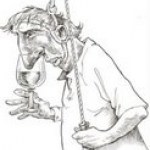Journalism
Just a quick note of congratulations to friends of Terra Sig (FOTS, if you will) on earning 2008 Awards for Excellence in Health Care Journalism from the Association of Health Care Journalists (AHCJ).
Online
FIRST: M.B. Pell, Jim Morris and Jillian Olsen, Center for Public Integrity, "Perils of the New Pesticides"
SECOND (tie): Tara Parker-Pope, The New York Times, The "Well" blog
SECOND (tie): Scott Hensley, Jacob Goldstein and Sarah Rubenstein, The Wall Street Journal Online, The Wall Street Journal Health Blog
THIRD: Randy Dotinga, Voice of San Diego, "Suicide Magnet" [Part I, Part II]
You…
From Jay Rosen:
As the crisis in newspaper journalism grinds on, people watching it are trying to explain how we got here, and what we’re losing as part of the newspaper economy crashes. Some are trying to imagine a new news system. I try to follow this action, and have been sending around the best of these pieces via my Twitter feed. It’s part of my experiment in mindcasting, which you can read about here.
I've not read all of it, but there's some good stuff in there.
Linotype operators work in the composing room at the P-I building at 6th and Wall Street in December, 1948. (Seattle Post-Intelligencer photo)
To follow up on my post about science journalism and blogs, a few reading links dealing with science in society, journalism, and the transformation of media.
First, Peter Dizikes revisits C.P. Snow's ubiquitous "two cultures", fifty years later:
"The Two Cultures" actually embodies one of the deepest tensions in our ideas about progress. Snow, too, wants to believe the sheer force of science cannot be restrained, that it will change the world -- for…
With print publications in crisis, the issue of how scientific information will be disseminated in the future has become a recurrent topic of discussion here on ScienceBlogs and all over the web. Recently, Ed Brayton of Dispatches from the Culture Wars criticized National Geographic and the "sorry state of popular science writing" because of an error in a story, to which Chris Mooney from The Intersection responded, pointing out that the economic situation print publications are forced to operate under should be considered in criticisms of the field. For Mooney, it's not errors he finds…
Illustration by David Parkins, Nature
Today, Nature released a news feature by Geoff Brumfiel on the downturn in mainstream science media. We've all known that this is happening; the alarms become impossible to ignore when Peter Dysktra and his team at CNN lost their jobs last year. For mainstream outlets like CNN or the Boston Globe to cut science may seem appalling - but in an unforgiving economic climate which has already triggered the collapse of major newspapers like the Seattle Post-Intelligencer, such cuts are logical, because science reporting isn't a big money-maker. The question…
Nobody is ever going to mistake me for Edward Tufte, but whenever I run across a chart like this one:
(from Matt Yglesias, who got it from Justin Fox where it was merely one of many equally horrible plots), I find myself distracted from the actual point of the graph by the awfulness of the presentation.
I mean, look at this thing. The numerical labels for the horizontal axis are up at the top, rather than at the bottom where they usually go. The label that states what's actually plotted on that axis is down at the bottom of the graph, where it appears to be just a stray bit of text labelling…
I've lost a lot of sleep this weekend staying up late to watch Syracuse games, so I'm only getting to some of the Friday articles in my RSS feeds now. I don't want to let this utterly worthless column by William Rhoden of the New York Times pass without comment though. It's ostensibly about the Syracuse-UConn six-overtime epic on Thursday night, but the actual description of the game is limited to two paragraphs at the very beginning that could've been written after twenty minutes of watching SportsCenter Friday morning.
The vast majority of the article-- seventeen of the twenty paragraphs--…
From Andrew Sullivan:
I watched the Daily Show with growing shock last night. Did you expect that? I expected a jolly and ultimately congenial discussion, after some banter. What Cramer walked into was an ambush of anger. He crumbled from the beginning. From then on, with the almost cruel broadcasting of his earlier glorifying of financial high-jinks, you almost had to look away. This was, in my view, a real cultural moment. It was a storming of the Bastille. It was, as Fallows notes, journalism.
This is truly is something to see, just as Stewart's pieces on Cramer and CNBC, back to his…
The winners of the American Physical Society's Science Writing Awards for 2008 were announced today:
Ann Finkbeiner won in the Journalist category for The Jasons, her book about a secretive groups of scientists who work on classified problems for the US government.
Gino Segre won in the Scientist category, for Faust in Copenhagen, about the early days of quantum mechanics.
Julia Cort won in the Broadcast category for the NOVA ScienceNow episode Asteroid, about whether a giant asteroid will kill us all in 2036.
Alexandra Siy and Dennis Kunkel have won in the Children's category, for their…
Inspired by Leigh Butler at tor.com, I've been re-reading Robert Jordan's Wheel of Time books. This happened to coincide with my recent vicious cold, which is good, because they're great sickbed reading.
Most of my re-reading has been done on my Palm, which miraculously came loaded with electronic copies of all the books. These are of, shall we say, variable quality, and riddled with typos, including one hilarious bit in which Rand is pursued by "Trollops." It's a little like reading the Wheel of Time as written by Matthew Yglesias.
As a result, the re-read is also serving as a nice reminder…
The Washington Post is facing criticism after refusing to issue a correction for an erroneous statistic cited by Op-Ed columnist George Will's column topic—that global sea ice levels are the same as they were in 1979. The statistic was summoned to support his column's viewpoint that global warming effects are exaggerated by "eco-pessimists." The statistic was attributed to the University of Illinois's Arctic Climate Research Center, which has posted a comment on its website saying their research indicates that levels of sea ice are, in fact, significantly lower today. The Washington Post…
In this week's Science Saturday, blogger and astronomer Phil Plait chats with science journalist Carl Zimmer. They talk about the time Buzz Aldrin punched a moon-landing denialist in the face, how consumer-culture gadgetry can serve the cause of science, the death of newspapers in the Internet age, and the big questions in astronomy that Phil hopes we'll have answers for soon.
For my DC peeps: I've been helping one of my colleagues with an event for college journalists, to be held next Friday at NIH (Bethesda, MD). It's a roundtable discussion on the challenges of covering addiction issues; scheduled guests include Lisa Stark of ABC News, Lauran Neergaard from the AP, and Jacqueline Duda of the WaPo, as well as scientists from NIH, NIDA, the University of Maryland and the University of Michigan. The event is free and open to college students at regional institutions of higher learning.
There is still some space left, so if you know any DC-area college students who…
The mainstream media are just queuing up to fail in their reporting of the propranolol story from a couple of days ago. To reiterate:
Propranolol is commonly used to treat high blood pressure and prevent migraines in children. But Merel Kindt and colleagues from the University of Amsterdam have found that it can do much more. By giving it to people before they recalled a scary memory about a spider, they could erase the fearful response it triggered.
The critical thing about the study is that the entire memory hadn't been erased in a typical sci-fi way. Kindt had trained the volunteers…
Effect Measure -- inspired by a thoughtful note from bird-flu ace reporter Helen Branswell -- ponders the implications of the increasing lack of specialization, and thus deep subject-specific expertise, among MSM reporters.
The conclusion we draw from this is that if you really want to know what's going on
in the flu world you shouldn't depend on newspapers as a source of information but go to the next (meta)level, where news, comment, the peer reviewed science literature and the gray literature of official reports, press releases, and rumor filters are done better (or at least different…
I've been having this 3:30 am (EST) insomnia for about the last two months, so I often pull the laptop up and survey the blogosphere in the still of the night. A simple look at the Last 24 Hours at ScienceBlogs and elsewhere in the blogosphere tells me that some knuckleheads in the mainstream press have taken issue with Dr Jill Biden, doctor of education, using the honorific, "Dr."
Keep in mind that the article in question comes from the L.A. Times - the very same paper that graces my e-mail account weekly humping their fishwrapper's science and environment coverage. I did just look up some…
Have you read the latest piece of anti-intellectualism to come out of the LATimes? Apparently, their so-called journalists are showing their ignorance by stating that Jill Biden, who earned her PhD in Education -- and who also happens to be the wife of Senator Vice President Joe Biden -- cannot be referred to as "Doctor Biden". What have they been smoking??
"My feeling is if you can't heal the sick, we don't call you doctor," said Bill Walsh, copy desk chief for the Washington Post's A section and the author of two language books. (He apparently agrees with the LATimes' stupidity, because…
I'm getting twinges in my neck indicating that I've been spending too much time looking at the computer, and I've got some computer-heavy work coming up in the next couple of weeks, so expect reduced blogging in the next few days. I couldn't let this essay in the New Yorker (via Matt Yglesias) pass without comment, though. It's arguing for a model of endowment-supported nonprofit journalism, but along the way it takes a shot at my alma mater:
Not to pick on any one institution, but, from a constitutional perspective, how did we end up in a society where Williams College has (or had, before…
Adelaide, South Australia, Australia, is a place that many have told me I must visit (although perhaps not now as they are experiencing record heat). In fact, a twist of science and friendships nearly brought me there for my sabbatical before I had a big change in my life. The University of Adelaide is outstanding (and home of colleague and Astroblog blogger, Ian Musgrave), the surrounding wine appellations are world-famous, and the mountains to the northwest would be a combination I'm told I'd be certain to enjoy.
Therefore, I was delighted to receive the following e-mail on 3 January from…
ScienceBloggers are up in arms about the cover article of New Scientist which boldly proclaims "Darwin was Wrong." The article, authored by Graham Lawton, explains that occurrences such as horizontal gene transfer and hybridization transform the shape of Darwin's famous tree into something more like a thicket with criss-crossing branches. But some argue that new information in genetics doesn't render Darwin's model obsolete, and, moreover, that the headline is misleading and could be used as a tool for Creationists. "Very few readers will read your article. But everyone will see the cover,"…


